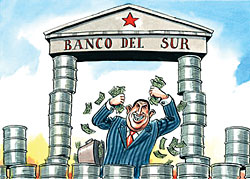 |
The World Bank's launch in late November of a five-year action plan for fighting the HIV/AIDS pandemic in Africa is emblematic of the Bank's new direction. The structural adjustment programs are of yesteryear.
Less controversial campaigns are becoming more common and economic strong-arming less frequent. Why the shift? The economies of some former Bank recipient countries have improved, loans repaid, and Bank presence ushered out. Venezuela, Bolivia and Ecuador have done as much, even creating a Bank of the South, launched in early December with four other South American countries.
The split from foreign aid is a significant one, even though western economists doubt that the southern three will survive on their own. Yet, the numbers already look promising and there is precedence for economic stability in foreign aid-free, developing countries.
Take Eritrea. Long an isolationist nation determined to be self-reliant, the country's GDP and income both rose nearly 9 percent in the last ten years, with adult illiteracy dropping by 8.4 percent. Life expectancy, school enrollment and primary school completion rate all increased, while mortality rate dropped substantially. During the same period, Eritrea's ratings on the UN Human Development Index which measures achievement in three dimensions (long healthy life, knowledge and a decent standard of living) rose 9.3 percent.
While Eritrea is no shining star ranking at an unenviable 130th in the HDI, it does challenge the paradigm of dependency, faced by many developing countries, on foreign aid. Its social indicators are improving, slowly but surely, and without the backing of the banks in the west.
Mimicking Eritrea's headstart on self-reliance, Venezuela, Bolivia, Ecuador and most likely others are eager to shrug off what they perceive as the political yoke of foreign aid. They think western aid is frequently aligned with the geopolitical priorities and interests of developed nations.
Not long after the Bank appointed Robert Zoellick and the IMF appointed France's Dominique Strauss-Kahn, South American nations announced their intentions to form the Bank of the South. Now, with December's launch, Argentina, Bolivia, Brazil, Ecuador, Uruguay, Paraguay and Venezuela have staked their self-reliant claim to be free of foreign philanthropy.
How the south will fare is yet to be seen. Venezuela's 2008 budget allocates 46 percent to the social sector with special attention to health, education, food aid, land reform, affordable housing, micro credit and job training. These are sectors in which the Bank and the IMF traditionally focused on.
Some economists see this as serious socialism. How dare Venezuela's President Hugo Chavez funnel oil and natural gas revenues into the social sector and rebuild the deteriorating infrastructure? How dare Bolivia's President Evo Morales consider an equitable nation-wide distribution of revenues stemming from natural resources? How dare Ecuador's President Rafael Correa decree that 99 percent of extra oil income will be distributed among the people, leaving only one percent for foreign firms?
They dare because they can. With fuel prices crossing $100 a barrel, oil-rich and gas-rich nations are exerting the same power on developed nations that they once did so determinedly on developing nations. The tables have turned and the formerly dependent are less so. And who's to blame them?
HIV/AIDS programs in Africa then for the Bank? With the pandemic on the rise throughout the continent, countries are in weak position to refuse assistance. Self-reliance in Sub-Saharan Africa may be slower to pick up steam than in South America. But don't be surprised if the African continent creates a Bank of its own sometime soon. The Eritrean model may well be worth mimicking.
Michael Shank is an analyst with George Mason University's Institute for Conflict Analysis and Resolution. Ami Carpenter is a fulltime instructor at California State University's Program on Negotiation, Conflict Resolution and Peacebuilding.


